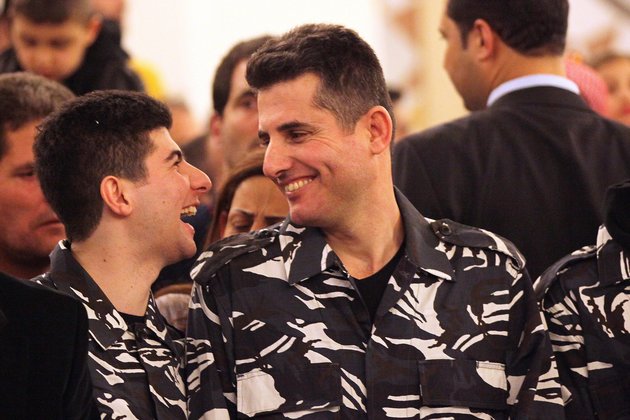

BEIRUT, Dec 1 (Reuters) – Al Qaeda’s Syrian wing freed 16 Lebanese soldiers and policemen on Tuesday in exchange for the release of jailed Islamists including the ex-wife of Islamic State leader Abu Bakr al-Baghdadi.
The Nusra Front seized the Lebanese 16 months ago during an attack on the Lebanese border town of Arsal mounted together with the Islamic State jihadist group which is still believed to be holding nine soldiers captured in the incursion.
The exchange, brokered by Qatar, cast new light on the Gulf state’s channels to the Nusra Front, a powerful player in the Syrian civil war that has been designated a terrorist group by the United Nations and United States.
Live TV footage from an area between Lebanon and Syria showed the Lebanese captives in vehicles accompanied by masked men armed with assault rifles and waving the Nusra Front flag before they were released to the Red Cross.
 AFP/Getty Images Al Qaeda’s Syrian wing freed 16 Lebanese soldiers and policemen on Tuesday in exchange for the release of jailed Islamists.
AFP/Getty Images Al Qaeda’s Syrian wing freed 16 Lebanese soldiers and policemen on Tuesday in exchange for the release of jailed Islamists. Thirteen Islamists in Lebanese jails, including Saja al-Dulaimi, the ex-wife of Baghdadi, were also released. Dulaimi, fully veiled, was shown in live TV footage from the area with her three children who were with her in prison.
Nusra Front fighters were shown kissing and hugging the sons of Dulaimi, who was arrested by the Lebanese authorities a year ago. Speaking to Al Jazeera, she said her wish was to return to Beirut and then to leave to Turkey.
"We accomplished the entire agreement with Nusra. We received our heroic soldiers and we are on our way back to Beirut," top Lebanese security official Abbas Ibrahim, who oversaw the swap, told Reuters by telephone.
"This joy not complete until the return of those kidnapped by Daesh. We are ready to negotiate with Daesh if we find someone to negotiate with," he said. Daesh is an Arabic name for Islamic State.
 Hussein Malla/ASSOCIATED PRESS The Nusra Front seized the Lebanese soldiers and policemen 16 months ago during an joint attack with the Islamic State on the Lebanese border town of Arsal. Nusra killed four of the captives.
Hussein Malla/ASSOCIATED PRESS The Nusra Front seized the Lebanese soldiers and policemen 16 months ago during an joint attack with the Islamic State on the Lebanese border town of Arsal. Nusra killed four of the captives.
The Nusra Front fighters chanted "God is great" as they arrived with the captives in preparation for the swap. One of the captives, interviewed by Al Jazeera, said the group had treated them well.
Nusra has killed four of the captives.
"Praise be to God. The joy cannot be described," another of the captives told Al Jazeera.
 Hussein Malla/ASSOCIATED PRESS Nine captured soldiers are still believed to be with the Islamic State group.
Hussein Malla/ASSOCIATED PRESS Nine captured soldiers are still believed to be with the Islamic State group. The Arsal incursion was a dramatic and bloody example of spillover from the 4-1/2 year old Syrian conflict. The army fought several days of lethal battles to drive the militants from the town not far from where Tuesday’s swap took place.
The exchange began with the Nusra Front releasing the body of one of the Lebanese soldiers it had killed in captivity, Mohamed Hamieh.
The freed soldiers and policemen were carried aloft during celebrations in the town of Labweh near the Lebanese border where they briefly stopped on their way to Beirut. Politicians from across the political spectrum congratulated the men on their release.
Relatives of the captives celebrated at a tented sit-in they have held near the government headquarters in Beirut since last year to press for negotiations. There was dancing and sweets were offered to visitors who went to congratulate them.
"I was born again today, this is a re-birth for me and my brother. It has been a year and five months of agony for the soldiers’ parents, my parents and me," Marie Khoury, the sister of freed soldier George Khoury told Reuters at the sit-in.
 Ratib Al Safadi/Anadolu Agency/Getty Images "Praise be to God. The joy cannot be described," one of the captives said.
Ratib Al Safadi/Anadolu Agency/Getty Images "Praise be to God. The joy cannot be described," one of the captives said. Qatar has been involved in efforts to mediate the release of the captives for a year or more. A previous effort to secure their release broke down a year ago after one of the captives was killed. The Qatar National News Agency said the successful mediation followed a request from the Lebanese government.
While the Nusra Front and Islamic State attacked Arsal together, the groups are enemies in the Syrian war, now in its fifth year.
Qatar has been a major sponsor of the insurgency against President Bashar al-Assad, supporting rebels including groups deemed moderate by the United States. It has denied backing the Nusra Front or Islamic State.
Qatar’s foreign minister told Reuters in June the country did not deal with either group, but said the door should be kept open for Syrians with the Nusra Front if they decided to leave al Qaeda.
 Ratib Al Safadi/Anadolu Agency/Getty Images "This joy not complete until the return of those kidnapped by Daesh," top Lebanese security official Abbas Ibrahim said.
Ratib Al Safadi/Anadolu Agency/Getty Images "This joy not complete until the return of those kidnapped by Daesh," top Lebanese security official Abbas Ibrahim said. (Additional reporting by Reuters TV, Omar Fahmy in Cairo and Tom Finn in Doha; Writing by Tom Perry; Editing by Andrew Heavens)



